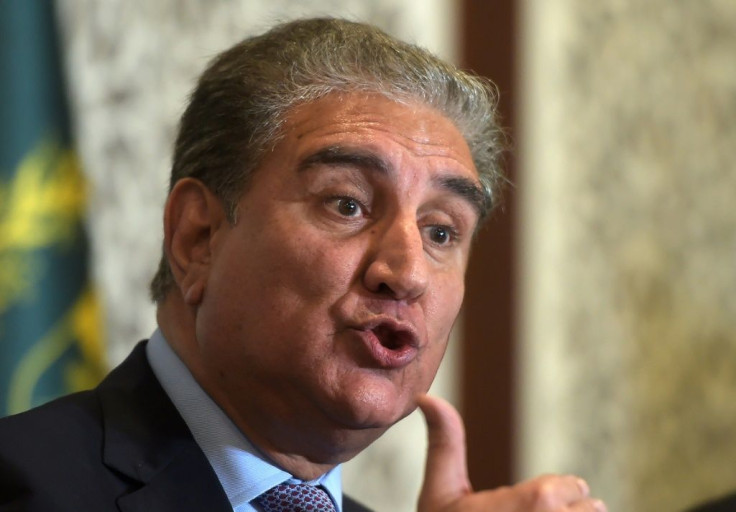US - Iran Conflict: How South Asians Are Reacting To The Attacks

KEY POINTS
- Bangladesh has 300,000 migrant workers in Iraq
- Pakistan has a large Shiite Muslim population that travels to Iraq on pilgrimages
- Indian navy was sent to Gulf to protect Indian trade ships
Both India and Pakistan issued advisories on Wednesday to their citizens to avoid traveling to Iraq, in the wake of missile attacks by Iran on U.S. forces.
“In view of the prevailing situation in Iraq, Indian nationals are advised to avoid all nonessential travel to Iraq until further notification,” India’s Ministry of External Affairs warned. “Indian nationals residing in Iraq are advised to be alert and may avoid travel within Iraq.”
The Indian Embassy in Baghdad and its consulate in Irbil remained open, the ministry added.
A spokeswoman for Pakistan’s foreign office tweeted Pakistanis should “exercise maximum caution while planning [a] visit to Iraq at this point.”
Pakistan has a significant Shiite population, many of whom travel annually to various shrines in Iraq on pilgrimages.
Thousands of Shiite protesters marched in Pakistan to demonstrate their solidarity with Iran, a Shiite nation.
Pakistan is a Sunni-dominated state with close ties to Sunni Saudi Arabia, as well as the U.S.
But Pakistan’s foreign minister said Islamabad will take no sides in the U.S.-Iran matter.
“We’re clear that Pakistan’s soil will not be used against any other state, and nor will Pakistan become a part of this regional conflict,” said Foreign Minister Shah Mehmood Qureshi. “Pakistan has taken a clear stance that Pakistan doesn’t endorse any unilateral action. The Middle East was and is volatile and this region can’t afford another war. We are part of this region and when a fire erupts there, Pakistan can’t escape.”
Qureshi also said he feared the killing of Iranian Gen. Qassem Soleimani by U.S. drones and the subsequent Iranian counterstrike on U.S. forces in Iraq could inflame sectarian tensions, especially in Afghanistan.
“We believe this could have a negative impact on Afghanistan, and that its peace process -- where Pakistan has played an important role -- could be affected and exploited by the spoilers,” Qureshi said.
Meanwhile, the Indian navy has deployed warships in the Persian Gulf area to guarantee the security of India's maritime trade and to respond to any further escalation of tensions between Iran and the U.S.
"Indian navy continues to monitor the situation in the gulf region and is maintaining [its] presence in the region to ensure [the] security of our seaborne trade and the safety of Indian flag merchant vessels transiting through the region," the navy said in a statement. "The Indian navy stands committed to protection of the nation's maritime interests.”
In Dhaka, Bangladeshi Foreign Minister A.K. Abdul Momen has also vowed to keep his country out of the ongoing drama between Iran and the U.S. while expressing concern for the welfare of millions of Bangladeshi migrants in the Middle East.
“Let others quarrel, but we have a balanced, independent and [nonaligned] policy -- friendship with all and malice to none. It is their fight, not ours,” he said.
Asked about Bangladeshis in Iraq, Momen replied: “Yes, we are fairly concerned about that. We are continuously inquiring about them. We have about 300,000 workers in Iraq. They all are well. They have not been in any trouble yet as what has happened [the killing of Soleimani] was a targeted killing. I spoke to our ambassador in Iraq [Monday] and asked him to remain alert.”
Momen added: “We feel restless if there is any problem anywhere in this globalized world, because there are 12.2 million Bangladeshis living in different countries. If there is no peace, it troubles Bangladesh. That’s why we want peace and stability. We are scattered throughout the world. We don’t want problems in any country.”
Speaking of Dhaka’s general foreign policy strategy, Momen reiterated that the country seeks good relations with all countries and does not intrude into their affairs.
“We are pursuing a balanced policy,” he said. “We don’t poke our head into the trouble between China and India. Our relationship with America, China and India and Saudi Arabia is very good. Our relationship is good with everyone. Our principled position: You fight while we’ll look after our interests.”
Nonetheless, the Bangladeshi government issued security alerts for its migrants living in Iraq.
"Bangladeshi migrants have been requested not to travel anywhere except their workplaces and residences and to avoid all sorts of meetings and gatherings if there is no special necessity," the Bangladesh Embassy in Baghdad said.
At least one group in Bangladesh has condemned the Dhaka government’s stance on the U.S.-Iran turmoil.
An organization called the National Committee Against Fascism and Imperialism said it “strongly condemn[s] U.S. President Donald Trump's blatant attack on Iraqi and Iranian military officials, which is a direct violation of Iraq's sovereignty and also of international norms.”
The body also chided Dhaka, adding: "It is a matter of great regret that the Bangladesh government has remained silent regarding the incident. We also urge them to take the right position concerning this issue."
© Copyright IBTimes 2025. All rights reserved.





















